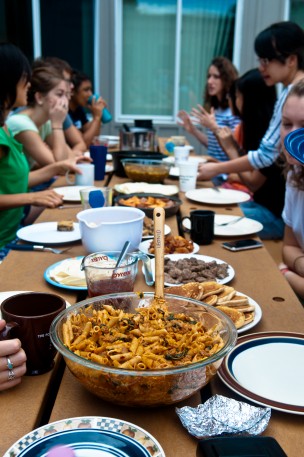
It’s Sunday morning, and the smell of maple syrup and peanut butter pancakes envelops your cozy room. You rise to a knock at the door—brunch is ready. In your pajamas, you make your way down to the outdoor breakfast table, where 15 of your peers and an endless array of colorful food await you.
It’s a typical Sunday morning in Full House, Wesleyan’s cooking-themed program house.
After waking up in my forced triple to the smell of leftover ramen noodles, I hopped on my bike and headed to 202 Washington Street to partake in Sunday brunch with the members of Full House.
Full House residents Maurice Hill ’14 and Leo Liu ’14 had risen at 8 a.m. that morning to begin the three-hour process of designing a comprehensive brunch menu and executing it to perfection.
The table overflowed with nutrition and creativity: sautéed sweet potatoes, sausage and cheddar cheese pasta, peanut butter pancakes with jelly preserve, vegan tofu curry…the list goes on.
“We always include a Vegan, Pescatarian, Vegetarian, and, of course, a meat-eater’s option in our menus,” Liu said. “Everyone needs to be accommodated for.”
Crafting a menu that caters to all of their members’ personal tastes is just one of the ways that Full House expresses their dedication to their culinary microcosm. The food-lovers of Full House have quite a few domestic customs. A list on the kitchen door that reads “things that make us happy” is annotated daily with quirky inside jokes and puns. Full House foodies leave tasty treats out on the counter for each other and draw pictures of vegetables, which they affectionally paste on the wall.
According to Andrew Ribner ’14, the residents of 202 Wash all get along—except for with the fruit flies.
The residents keep organized with an online cooking calendar that delegates who will cook throughout the semester. Each member cooks once a semester (either for Sunday brunch or for dinner) with a partner. Members volunteer to clean after “family meals” each Sunday. The cleaning crew is led by the two chefs for that week.
“Full House really feels like a family community,” said Ribner. “The only drawback of living here is the distance from campus, but it’s totally worth the bike ride.”
However, Full House’s influence extends beyond 202 Washington Street.
At the house meeting, one member brought up the “Housing for Hunger” project she is currently participating in, a program that gives free cooking lessons and tips on how to make healthy meals to members of the food pantry in Middletown.
When Lila Becker ’12 first created Full House in 2008, she hoped to provide a place for Wesleyan foodies to share and discuss their favorite meals with each other.
“I felt that there were no program houses that catered to food-lovers in particular,” Becker wrote in an email to The Argus. “As a kitchen-starved freshman in the Butts, all I wanted was somewhere to cook with friends.”
Becker proposed her idea to ResLife representatives and was connected to Ali San Román ’11, who had a similar proposal. By 2009, over 60 freshman had applied to live in Full House.
“Contrary to what some believe, you don’t actually have to be a pro chef to live in Full House,” Becker wrote. “The only requirements are a love of food and an interest in cooking.”


Leave a Reply